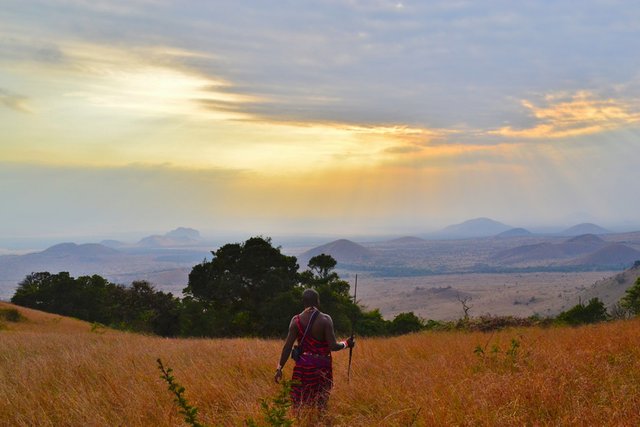Survival of the Fattest
Back when our lives consisted of gathering berries and hunting deer (over 12.000 years ago) we didn’t always get direct access to food. If the tribe got lucky they would have a constant supply of food. If they got unlucky, well, they starve. During these periods of famine, it often happened that a half or even two-thirds of the tribe would die from starvation. If all these people had no access to food, what made only some of them survive?
Dense Energy
If you don’t eat food your body still needs energy. Our bodies rely on several types of energy storage. One of these is glycogen, which is a polysaccharide that effectively consists of a string of glucose. It is the glucose storage unit of the body and it is mostly stored in the liver and skeletal muscle.
The second and much more efficient energy storage unit is fat, which is stored in adipose tissue. Fat is ideal for long-term storage because of the density of the energy stored inside it. Body fat tissue contains approximately 30 kJ/gram and glycogen only 4.2 kJ/gram.
If glycogen is so inefficient, why not store all the energy in fat? Glycogen has the unique capability of controlled breakdown and thus release of glucose. It is therefore important to keep our blood glucose levels somewhat constant, and our body is all about homeostasis.
Survival of the Fattest
Back to our tribe that had lost access to food. Who survives and who doesn’t? We just discussed that fat is the best energy storage the human body has to offer. So naturally, if your body is prone to storing fat and holding on to it then you have a distinct advantage in periods of famine. When the tribe was in a period of famine, the people with more fat stored inside their body would survive. Their bodies were best adapted for long periods without nutritious food. Life in these times was quite literally ‘survival of the fattest’.

Abundance
Now the tables have turned. We had a situation where food was scarce, and 10.000 years later we face a situation wherein most of the modern world food is readily available. To further drive this point home: 10.000 years might seem like a long time, but evolutionary it is a blip on the time scale of human development. So while the availability of food has drastically changed, the way our body handles food has only changed minimally, if it has at all.
Now that food is readily available there is no longer survival of the fattest. The fattest are actually more at risk! Cardiovascular disease and diabetes type 2 are on the rise amongst the heavier demographics. It is the thinner people that have better health prospects and live the longest lives.
Ethan Sims and the Vermont state prison
To further discuss what causes our bodies to be more prone to store fat, it is of interest to look at a study done by a clinical investigator by the name of Ethan Sims. He is internationally known for his research on obesity and diabetes. He is the one who coined the term ‘diabesity’, which was used to describe the combination of genes and environment acting together to cause the disease type 2 diabetes.
Ethan Sims performed an experiment at the Vermont state prison. His initial hypothesis was that as thin people got fat, changes in blood biochemistry would be observed that were similar to the blood biochemistry of already obese people. He wanted to find out if the changes in blood biochemistry were the cause or the result of becoming obese. To do his experiment he made the inmates of the Vermont prison increase their body weight in fat storages by 25%. In exchange, the inmates could have an early release. Result: The inmates ate as much as they physically could!
Why are they not gaining weight?
The goal for the inmates was to gain at least 25% of their original body weight. Except after 2 months, the average increase was only 21% and seemed to have reached a hard limit. Even though the prisoners were eating up to four times the calories their body required they couldn’t gain more weight. Some inmates did make the 25%, while other inmates barely reached an 18% increase.
Three conclusions can be made from the acquired data:
- Basal Metabolic Rate increased as food intake was increased. When the food intake was lowered to normal levels the BMR readjusted to normal levels as well.
- When the inmates were deliberately overeating they did not have a permanent increase in adiposity (i.e. being fat) after they continued eating normally.
- The number of consumed calories did not conform to the amount of weight gained.
These conclusions prove that our bodies are highly adaptable and capable of dealing with short-term changes to the dietary caloric intake. We can also quickly return to the ‘baseline’ when the dietary caloric intake is set back to normal values. The conclusions suggest that the changes to the bodies blood chemistry are more a result of obesity than a cause of it.
Some people have a genetic predisposition to gain fat, while others have a predisposition to stay thin. When overeating, our body makes adaptations to basal metabolic rate and diet-induced thermogenesis in an attempt to remain at a constant weight (again homeostasis!).
If we relate this back to our tribe facing a sudden famine we would also expect the variety in fat storage ability as was observed with the inmates. As a result, we have survival of the fattest!

What is your experience with food? Do you see the scale go up when you start eating an extra hamburger or are you one of those who can eat what they want without every worrying about gaining weight?
References:
Why are thin people not fat?
Glycogen
Body Fat Energy
Energy density of glycogen stores
Metabolic response to experimental overfeeding in lean and overweight healthy volun-teers
Ethan Allen Sims
Why Am I Always Cold?
Related from @Altherion
Total Daily Energy Expenditure
2017 – Obesity update
Paper discussion 2
Paper discussion 1
The Atwater Study
Images :
Unsplash
by FoodLabScience

A scientist’s food for thought!
I have also noted that this changes with age. I know some people eating a lot when they were young, without taking a single gram. Now, 30 years later, they are getting fatter much faster.
That is also an interesting phenomenon. If I would have to guess it is because of the quicker muscle degradation that usually happens at older ages. I believe it was due to a less efficient digestion of protein at an older age and thus fewer resources for the muscles. A reduction of muscle mass also reduces the overall energy needed. If people keep it eating the same then this might be an explanation.
Although I could be totally wrong here...
What you say makes sense to me, at least ;)
I have a tolerance range (x +/-300kcal) where my weight does not change much. And I need to go over it to gain or below to lose weight.
I hadn't read about Sims before. Thank you.
@Cristi has a lot of good posts about fasting, ketogenesis, and weight control. I also wrote something external to Steemit that might interest you.
"Hacking the Weight-O-Stat"
http://www.intergalacticmedicineshow.com/cgi-bin/mag.cgi?do=columns&vol=randall_hayes&article=023
Thank you for the recommendations @plotbot2015. I'm glad to add those to my reading list. Made sure to follow both of you. Merry Christmas!
Thanks for the follow. Merry Christmas!
That sounds mildly sexual 😄
I love the title of this post. Nothing like a good catchy title to drive the point home and make it memorable. I'm borrowing it permanently, and crediting you, unless I find an earlier source!
Reason for the excitement being that this jibes well with my arguments in this post. It's a discussion about whether women naturally like shredded bodies, or whether it's more likely a result of societal brainwashing. (Note, liking strong men =/= liking shredded muscular bodies as they are portrayed today.) The most relevant paragraph is this:
"Btw, 1% more fat on Tarzan's body, and poof, there's no body. No shred of it remains. Natural bodies, mind you, are made to preserve fat. An ancestor who could preserve any amount of calories on his body more efficiently than another would be preferentially selected for. The amount of body fat you need to look shredded is the amount of body fat you need to die from starvation when food supplies become scarce. Tarzan Lord of the Jungle would not have survived in the Jungle. At least not looking like he does in that movie."
I've noticed there are some imgs missing from the post now cos it's old, so here they are in case you're interested in reading it:
Kyle 1984:
Revenge 1955:
Maori youth:
I think I've seen that post before! I enjoyed reading it very much, you have a great writing style.
One note on your post that I was thinking of. It is interesting how women are expecting muscular and fit men while also promoting the 'good looking at all sizes' for themselves. At least that is some of what I experience in my section of the internet.